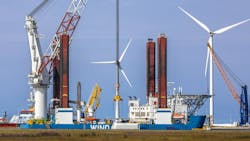Offshore wind market reaches crossroads, says EY report
Offshore staff
LONDON – Turbulent times in the offshore wind sector could change the way large-scale energy projects are built and funded in the future, according to the latest EY Renewable Energy Country Attractiveness Index (RECAI).
Offshore wind is crucial to achieving net zero, but the industry has experienced a difficult 12 months, challenged by a squeezed supply chain and escalating costs. Global project costs have risen by 39% since 2019 and the next decade could see cost inflation adding around $280 billion in capital expenditure for the sector.
Against this backdrop, around 80% of the 15 markets with offshore wind targets for 2030 are predicted to miss their stated goals. Not least, the UK has conceded its lead position as the most attractive country to host offshore wind projects, falling three places to 7th position on the overall index.
In September 2023, the maximum strike price of £44 (US$54) per megawatt hour for offshore wind in the UK’s fifth allocation round (AR5) was not sufficient to entice developers to bid. This represents a huge setback in the UK’s goal of reaching 50GW of offshore capacity by 2030.
Arnaud de Giovanni, EY Global Renewables Leader, said: “The offshore wind sector has reached an inflection point at a time when the climate emergency is demanding urgent investment to meet global net zero targets. For offshore wind to fulfill its role in global decarbonization, it is necessary to mitigate risks that are beyond the control of developers, guaranteeing them a reasonable return on their investments. Tensions in the offshore supply chain could be alleviated by standardizing technologies, offering greater certainty to manufacturers and developers. And governments need to devise strategies that simplify and expedite the consenting process, minimizing risks between the issue of offtake agreements and final investment decisions.”
Ben Warren, EY Renewables Corporate Finance and RECAI Chief Editor, said: “The UK’s recent challenges in the offshore wind sector echo a broader, global struggle. When auctioning contracts for offshore wind generation, governments need to reflect economic conditions in the design of the auction. Considering moving away from cost-only auction formats and incorporating factors other than cost, such as environmental considerations and jobs creation, would boost the supply chain, improve deliverability and benefit wider society.”
12.04.2023
